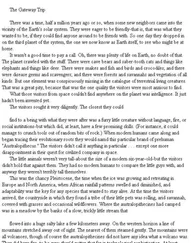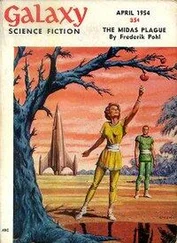Pohl, Frederik - Beyond the Blue Event Horizon
Здесь есть возможность читать онлайн «Pohl, Frederik - Beyond the Blue Event Horizon» весь текст электронной книги совершенно бесплатно (целиком полную версию без сокращений). В некоторых случаях можно слушать аудио, скачать через торрент в формате fb2 и присутствует краткое содержание. Жанр: Старинная литература, на английском языке. Описание произведения, (предисловие) а так же отзывы посетителей доступны на портале библиотеки ЛибКат.
- Название:Beyond the Blue Event Horizon
- Автор:
- Жанр:
- Год:неизвестен
- ISBN:нет данных
- Рейтинг книги:4 / 5. Голосов: 1
-
Избранное:Добавить в избранное
- Отзывы:
-
Ваша оценка:
- 80
- 1
- 2
- 3
- 4
- 5
Beyond the Blue Event Horizon: краткое содержание, описание и аннотация
Предлагаем к чтению аннотацию, описание, краткое содержание или предисловие (зависит от того, что написал сам автор книги «Beyond the Blue Event Horizon»). Если вы не нашли необходимую информацию о книге — напишите в комментариях, мы постараемся отыскать её.
Beyond the Blue Event Horizon — читать онлайн бесплатно полную книгу (весь текст) целиком
Ниже представлен текст книги, разбитый по страницам. Система сохранения места последней прочитанной страницы, позволяет с удобством читать онлайн бесплатно книгу «Beyond the Blue Event Horizon», без необходимости каждый раз заново искать на чём Вы остановились. Поставьте закладку, и сможете в любой момент перейти на страницу, на которой закончили чтение.
Интервал:
Закладка:
“I wish-“ S. Ya. Lavorovna-Broadhead had said.
Before her voice was halfway through the first vowel the sound-activated gate in the monitor’s receiver summoned up her secretarial program. The secretary did not appear. She read the first trace of the name that followed- “-the Albert Einstein-“
matched it against her command store, made a probabilistic assessment of the rest and issued an instruction. That was not all the secretary did. Before that she had recognized the voice of S. Ya. and confirmed that it was that of an authorized person-the person who had written her, in fact. She checked her store for undelivered messages, found several, and weighed their urgency. She made a quick sweep of Essie’s telemetry readings to estimate her physical condition, retrieved the memory of her proximate surgery, balanced them against the messages and the present instruction, and decided the messages need not be delivered, and in fact could be handled by Essie’s surrogate. All that took very little time and involved only a minor fraction of the secretary’s full program. She did not need to remember, for instance, what she was supposed to look like or how her voice was supposed to sound. So she did not bother.
The secretary’s instruction woke “Albert Einstein”.
He did not at first know that he was Albert Einstein. As he read his program he discovered several things about himself. First, that he was an interactive information-retrieval program, whereupon he searched for and found addresses for the principal categories of information he was supposed to supply. Second, that he was heuristic and normative, which obliged him to look for the rules, in the form of go and no-go gates, that determined his decision-making. Third, that he was the property of Robin-a.k.a. Robinette, Rob, Robby, Bob or Bobby-Stetley Broadhead and would be required to interact with him on a basis of “knowing” him. This impelled the Albert program to access the Robin Broadhead files, and rehearse their contents-by far the most time-consuming part of his task so far. When all this was done he discovered his name and the details of his appearance. He made a series of arbitrary choices of costume-pullover sweater, or stained gray sweatshirt; slippers or frayed tennis shoes with a toe poking out; socks or none-and appeared in the tank of the monitor in the guise of the real Albert Einstein, pipe in hand, mild eyes humorously inquiring, before the last echo of the command had died.
“-program.”
He had had plenty of time. It had taken Essie nearly four-tenths of a second to speak his name.
As she had spoken in English, he greeted her in the same language. “Good-“ quick check of local time, “morning,-“ fast assessment of Essie’s mood and condition, “Mrs. Broadhead.” If she had been dressed for the office he would have called her “Lavorovna.”
Essie studied him appraisingly for several seconds, an infinity of time for Albert. He did not waste it. He was a shared-time program, and the parts of his capacity that were not in active use at any particular pico-second busied themselves at other tasks.
Whatever task was going. While he waited, parts of him were excused to help other programs make a weather forecast for a sport-fishing vessel leaving Long Island Sound, teach the conjugation of French verbs to a little girl, animate a sexual doll for a wealthy, and quirky, old recluse, and tally gold prices received from the Peking exchange. There were almost always other tasks on line. When there were not, there were the waiting batch-process files of less urgent problems-nuclear particle path analysis, the refinement of asteroid orbits, the balancing of a million checkbooks-that any of the sixty billion gigabits might turn a hand to in an idle moment.
Albert was not the same as Robin’s other programs-the lawyer, the doctor, the secretary, the psychoanalyst, or any of the surrogates who functioned for Robin Broadhead when Robin was busy or disinclined. Albert shared many memories with them. They freely accessed each other’s files. Each had a specific universe of action, tasked for specific needs; but they could not carry out their tasks without awareness of each other.
Apart from that, they were each the personal property of Robin Broadhead, slaved to his will. So sophisticated was Albert that he could read contextual clues and deduce imperatives. He was not limited in his responses by what Robin said to him. He was able to read deeper questions from the totality of everything Robin had ever said, to any of his programs. Albert could not betray a confidence of Robin’s, or fail to recognize what was confidential. Generally.
There were exceptions. The person who had written Albert’s program in the first place could easily write an overriding command, and had.
“Robin instructed you to prepare summaries for me,” Essie told her creation. “Give them to me now.” She watched critically and also admiringly as the program she bad written nodded, scratched its ear with its pipestem and began to speak. Albert was quite a good program, she thought with pride. For a collection of electronic impulses living in rag stores-weakly crystalline dichalcogenides with the structure of a wet dishrag-Albert was a rather attractive person.
She adjusted her tubes and piping and leaned back against pillows to listen to what Albert had to say. It was all most exceedingly interesting. Even to her, even at this time when in-what was it?-in less than one hour ten minutes she would be sponged and stripped and shaved and basted for further invasions of her inner person. As all she demanded of the Albert program at this time was edited memories of conversations that had already occurred, she knew that he had dismissed large parts of himself to other work. But what was left, she observed critically, was quite solid. The transition from the interactive Albert waiting for her question to the remembered Albert talking to her husband was done smoothly and without jumps-if one did not look for such minor imperfections as that the pipe was suddenly alight, and the socks abruptly pulled up over the ankles. Satisfied, Essie paid attention to the content of what was going on. It was not just one conversation, she perceived. There were at least three. Robin must have been spending a lot of time talking to his science program in Brasilia, and while one part of her mind was listening to the exciting news from Heechee Heaven another part was smiling at herself. How amusing that she should be pleased at this evidence that he had not used his hotel suite for other purposes! (Or at least not exclusively, she amended.) He could not have been blamed if he had chosen a living companion instead. Even a female one. Under the circumstances, with a main lover in no condition to be very responsive, she would certainly have felt free to do the same. (Well, not certainly. There was enough early Soviet prudishness left in Essie for at least a doubt.) But she admitted to herself that she was pleased, and then made herself attend to the truly fascinating things that were being said. So much happening! So much to absorb!
First, the Heechee. The Heechee in Heechee Heaven were not Heechee! Or at least those Old Ones were not. It was proved by the bioassay of the DNA, Albert was earnestly assuring her husband, punctuating his arguments with pipe thrusts. The bioassay had produced not an answer but a puzzle, a basic chemistry that was neither human, nor yet inhuman enough to come from creatures evolved around some other star. “Also,” said Albert, puffing, “there is the question of the Heechee seat. It does not fit a human being. But neither does it fit the Old Ones. So for whom was it designed? Alas, Robin. We do not know.”
A quick flicker, the socks now gone, the pipe out and being filled, and Albert was talking about prayer fans. He had not, Albert apologized, unriddled the fans. The literature was vast but he had searched it all. There was no imaginable application of energy and no instrumentation that had not been applied to them. Yet they had stayed mute. “One can speculate,” Albert said, striking a match to his pipe, “that all of the fans left for us by the Heechee are garbled, perhaps to tantalize us. I do not believe this. Rafliniert 1 stder Herr Hietschie, aber Boshaft 1 ster nicht,” In spite of everything, Essie laughed out loud. Der Herr Hietschie indeed! Had she written this sense of comedy into her program? She thought of interrupting him to command that he display this section of his instructions, but already that replay had ended and a slightly less rumpled Albert was talking about astrophysics. Here Essie almost closed her ears, for she quickly had enough of curious cosmologies. Was the universe open-ended or closed? She did not strongly care. Was some large quantity of mass “missing”, in the sense that not enough could be observed to account for known gravitational effects? Very well, then let it stay missing. Essie felt no need to go looking for it. Someone’s fantasy of storms of indetectible pious, and someone else-someone named Kiube’snotion that mass might be created from nothing, interested her very little. But when the conversation switched to black holes, she paid close attention. She was not really concerned with the subject. She was concerned with Robin’s concern for it.
Читать дальшеИнтервал:
Закладка:
Похожие книги на «Beyond the Blue Event Horizon»
Представляем Вашему вниманию похожие книги на «Beyond the Blue Event Horizon» списком для выбора. Мы отобрали схожую по названию и смыслу литературу в надежде предоставить читателям больше вариантов отыскать новые, интересные, ещё непрочитанные произведения.
Обсуждение, отзывы о книге «Beyond the Blue Event Horizon» и просто собственные мнения читателей. Оставьте ваши комментарии, напишите, что Вы думаете о произведении, его смысле или главных героях. Укажите что конкретно понравилось, а что нет, и почему Вы так считаете.












